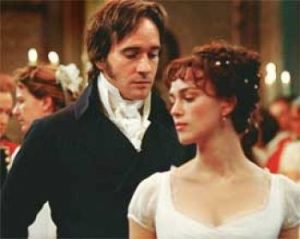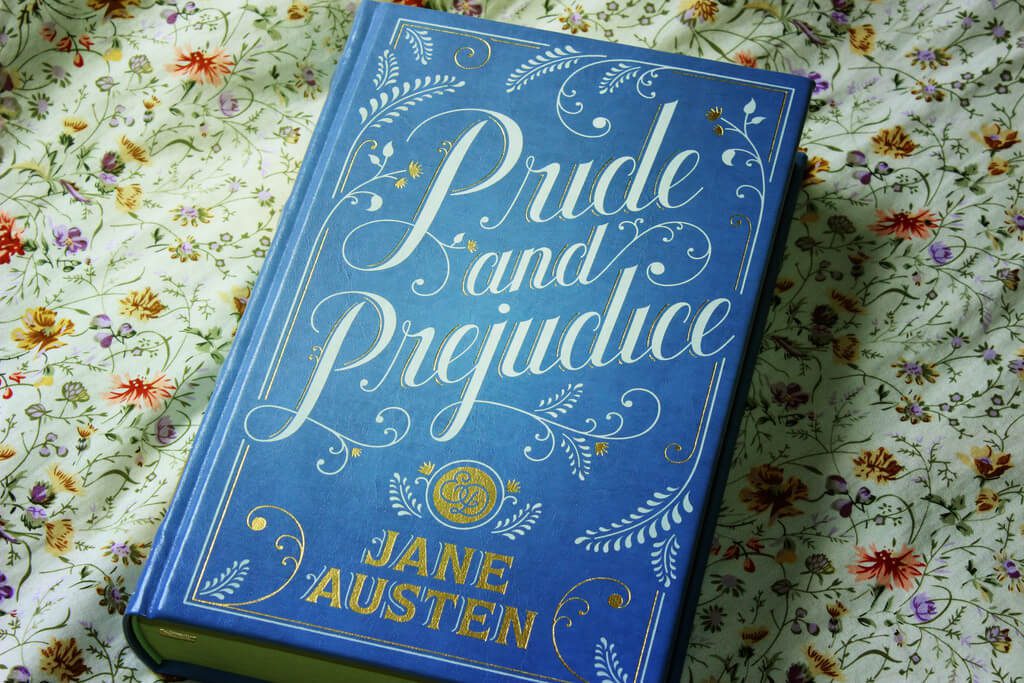Pride and Prejudice is an 1813 romantic novel of manners written by Jane Austen. Soma reviews it, exclusively for Different Truths.
 Pride and Prejudice has consistently appeared near the top of lists of ‘most-loved books’ among literary scholars and the reading public. It has become one of the most popular novels in English literature with over 20 million copies sold and has inspired many derivatives that abound in modern literature.
Pride and Prejudice has consistently appeared near the top of lists of ‘most-loved books’ among literary scholars and the reading public. It has become one of the most popular novels in English literature with over 20 million copies sold and has inspired many derivatives that abound in modern literature.
It has become one of the most popular novels in English literature with over 20 million copies sold and has inspired many derivatives that abound in modern literature.
Mr Bennet of Longbourn estate has five daughters, but because his property is entailed it can only be passed from male heir to male heir. Consequently, Mr Bennet’s family will be destitute upon his death. Because his wife also lacks an inheritance, it is imperative that at least one of the girls marry well to support the others upon his death, which is a motivation that drives the plot.
The novel opens with Mrs Bennet trying to persuade Mr Bennet to visit Mr Bingley, a rich bachelor who has arrived in the neighbourhood. After some verbal sparring with Mr Bennet baiting his wife, she believes he will not visit. A little while later, he does make the visit to Netherfield, Mr Bingley’s rented house, much to the delight of Mrs Bennet and her daughters. The visit is followed by an invitation to a ball at the local assembly rooms that the whole neighbourhood will attend.
At the ball, Mr Bingley is open and cheerful, popular with all the guests and appears to be very attracted to Miss Jane Bennet, with whom he dances twice.
At the ball, Mr Bingley is open and cheerful, popular with all the guests and appears to be very attracted to Miss Jane Bennet (the Bennets’ eldest daughter), with whom he dances twice. His friend Mr Darcy is reputed to be twice as wealthy; he is haughty and aloof and his manners cause everyone to turn from interest to a decided dislike of him. He declines to dance with Elizabeth (the Bennets’ second eldest daughter), stating that she is not pretty enough to tempt him. She finds this amusing and jokes about it with her sisters. Mr Bingley’s sister, Caroline, later invites Jane to visit.
When Jane visits Miss Bingley, she is caught in a rain shower on the way and comes down with a bad cold. Elizabeth visits Jane at Netherfield. There Mr Darcy begins to be attracted to Elizabeth, while Miss Bingley becomes jealous, as she herself has designs on him.
Mr Collins, a cousin of Mr Bennet and heir to the Longbourn estate after Mr Bennet dies, visits the Bennet family. He is a pompous, obsequious clergyman who intends to marry one of the Bennet girls.
Mr Collins, a cousin of Mr Bennet and heir to the Longbourn estate after Mr Bennet dies, visits the Bennet family. He is a pompous, obsequious clergyman who intends to marry one of the Bennet girls. When he learns that Jane may be engaged, he quickly decides to propose to Elizabeth as the next in both age and beauty.
Elizabeth and her family meet the dashing, charming officer George Wickham, who singles out Elizabeth and tells her how Mr Darcy deprived him of a living (position as clergyman in a prosperous parish with good revenue that, once granted, is for life) promised to him by Mr Darcy’s late father. Elizabeth’s dislike of Mr Darcy is confirmed.
At a ball at Netherfield, Mr Darcy asks Elizabeth to dance, and, despite her vow never to dance with him, she accepts. Other than Jane and Elizabeth, several members of the Bennet family show a distinct lack of decorum.
At a ball at Netherfield, Mr Darcy asks Elizabeth to dance, and, despite her vow

never to dance with him, she accepts. Other than Jane and Elizabeth, several members of the Bennet family show a distinct lack of decorum. Mrs Bennet hints loudly that she fully expects Jane and Bingley to become engaged, and the younger Bennet sisters expose the family to ridicule by their silliness.
Mr Collins proposes to Elizabeth, who rejects him, to the fury of her mother and the relief of her father. Shortly after, they receive news that the Bingleys are suddenly leaving for London with no plans to return. After his rejection by Elizabeth, Mr Collins proposes to Charlotte Lucas, a sensible young woman and Elizabeth’s friend. Charlotte is older (27) and is grateful to receive a proposal that will guarantee her a comfortable home. Elizabeth is aghast at such pragmatism in matters of love. Heartbroken, Jane goes to visit her Aunt and Uncle Gardiner in London. There it becomes clear that Miss Bingley does not want to resume their friendship and Jane is upset, though very composed.
Fitzwilliam tells Elizabeth how Mr Darcy managed to save a friend from a bad match. Elizabeth realises the story must refer to Jane and is horrified that Mr Darcy has interfered.
In the spring, Elizabeth visits Charlotte and Mr Collins in Kent. Elizabeth and her hosts are invited to Rosings Park, the imposing home of Lady Catherine de Bourgh, patroness of Mr Collins and Mr Darcy’s wealthy aunt. She expects Mr Darcy to marry her daughter. Mr Darcy and his cousin, Colonel Fitzwilliam, are also visiting at Rosings Park. Fitzwilliam tells Elizabeth how Mr Darcy managed to save a friend from a bad match. Elizabeth realises the story must refer to Jane and is horrified that Mr Darcy has interfered. Mr Darcy proposes to Elizabeth declaring his love for her. She rejects him angrily, stating that she could not love a man who has caused her sister such unhappiness and further accuses him of treating Wickham unjustly. The latter accusation angers Mr Darcy and he accuses her family of lacking propriety and suggests he has been kinder to Bingley than to himself.
Later, Mr Darcy gives Elizabeth a letter, explaining that Wickham had refused the living and was given money for it instead. Wickham proceeded to waste the money and when impoverished, asked for the living again. After being refused, he tried to elope with Darcy’s 15-year-old sister, Georgiana, for her large dowry. Mr Darcy also writes that he believed Jane, because of her reserved behaviour, did not love Bingley. Mr Darcy apologises for hurting Jane and Elizabeth.
When Mr Darcy returns unexpectedly, he is exceedingly gracious and later invites Elizabeth and the Gardiners to meet his sister and Mr Gardiner to go fishing. Elizabeth is surprised and delighted by their treatment.
Some months later, Elizabeth and the Gardiners visit Darcy’s estate in Derbyshire, Pemberley (after Elizabeth ascertains that the owner will not be there). On a tour, the housekeeper describes him as being kind and generous. When Mr Darcy returns unexpectedly, he is exceedingly gracious and later invites Elizabeth and the Gardiners to meet his sister and Mr Gardiner to go fishing. Elizabeth is surprised and delighted by their treatment. She then receives news that her sister Lydia had eloped with Wickham. She tells Mr Darcy immediately and departs in haste, believing she will never see him again since Lydia has ruined the family’s good name.
After an agonising wait, Wickham has agreed to marry Lydia. With some veneer of decency restored, Lydia visits her family and tells Elizabeth that Mr Darcy was at her wedding. Mrs Gardiner informs Elizabeth that it is Mr Darcy who made the match, at great expense and trouble to himself and hints that he may have “another motive” for doing so.
Elizabeth has difficulty in convincing her father that she is marrying for love, not position and wealth, but in the end Mr Bennet is convinced.
Mr Bingley and Mr Darcy return to Netherfield, and Bingley proposes to Jane who accepts him. Lady Catherine, having heard rumours that Elizabeth intends to marry Mr Darcy, visits Elizabeth and demands that she promise not to accept his proposal. Elizabeth refuses and the outraged Lady Catherine leaves. Darcy, heartened by Elizabeth’s response, again proposes to her and is accepted. Elizabeth has difficulty in convincing her father that she is marrying for love, not position and wealth, but in the end Mr Bennet is convinced.
Characters
Lively and Quick-witted Elizabeth Bennet
The novel’s protagonist and the second oldest of her five sisters, Elizabeth Bennet is lively, quick-witted, sharp-tongued, bold and intelligent. She is keen and perceptive, but Elizabeth’s pride in that very ability engenders a prejudice that almost hinders her happy future with Darcy. Elizabeth is not impressed by mere wealth or titles, rather, she values propriety, good-manners, and virtue.

Wealthy Aristocrat Mr. Darcy
An extremely wealthy aristocrat, Mr. Darcy is proud, haughty and extremely conscious of class differences (at least at the beginning of the novel). He does, however, have a strong sense of honor and virtue and a degree of fairness that helps him to control his pride after Elizabeth rebukes him for his narrow-minded perspective.
Beautiful and Selfless Jane Bennet
Jane Bennet, the oldest Bennet daughter, is beautiful, good-tempered, amiable, humble, and selfless. Her good nature does result in a level of naiveté, especially when it comes to recognizing the wickedness of others. Her sweetness leaves her vulnerable to injury from insincere friends like Caroline Bingley. A rather static character, Jane remains a model of virtue throughout the novel.
Amiable Mr. Bingley
Much like his beloved Jane, Charles Bingley is an amiable and good-tempered person, mostly unconcerned with class differences despite his extraordinary wealth. His virtue proves to be his vice at times, since his modesty leads him to be easily swayed by the opinions of others. A mostly static character, Bingley remains pleasant and in love with Jane throughout the novel.
Charming and Dissolute Mr. Wickham
An officer in the regiment stationed at Meryton, Officer Wickham possesses a charm that hides his dissolute, untrustworthy personality. He was godson to Darcy’s father. However, Wickham betrayed Darcy by seducing Georgiana when she was only 15. He also spreads false rumors about Darcy throughout Hertfordshire and Meryton. Overall, Wickham is driven by self-interest, revealed by his many romantic engagements (or lack thereof, in the case of Elizabeth). He is also a static character and marries Lydia only because Darcy provides a financial incentive. In the epilogue, Austen implies that Wickham tires of Lydia after a certain point.
Foolish and Frivolous Mrs. Bennet
Mrs. Bennet is a foolish and frivolous woman. She lacks any sense of propriety and neglects to provide her daughters with a proper education. Instead, she remains concerned solely with securing them profitable marriages. Her lack of self-awareness constantly embarrasses Elizabeth and Mr. Bennet alike.
Intelligent Mr. Bennet
An intelligent man with good sense, Mr. Bennet displays an unfortunate disinterest in most of his family (besides Elizabeth). He seems weary after spending many decades married to the interminable Mrs. Bennet. His complacency is shaken only when Lydia’s her poor decisions in Brighton threaten her future.
Foolish and Flirtatious Lydia
The youngest of the Bennet sisters, Lydia Bennet is foolish and flirtatious. She gratifies her every whim without considering the consequences. She is Mrs. Bennet’s favorite daughter because they share similar (though frivolous) interests. She is obsessed with the regiment officers, and lets her lack of virtue and propriety lead her into a near-disaster with Wickham.
Impressionable Catherine Kitty
Catherine “Kitty” Bennet, the second youngest Bennet daughter, exhibits little personality of her own. Instead, she imitates Lydia in almost everything until Lydia leaves for Brighton. The epilogue leads the reader to hope that Kitty’s character improves as a result of spending time with her elder sisters instead of Lydia.

Solemn and Pedantic Mary
The middle Bennet sister, Mary, is strangely solemn and pedantic. She dislikes going out into society and prefers to spend her time studying. In conversation, Mary constantly makes awkward and profound observations about human nature and life in general. Some critics believe Mary was a cipher for Austen herself.
Comic Mr. Collins
Mr. Collins is a distant cousin of the Bennet family to whom Longbourn has been entailed. He is mostly a comic character because of his awkward mix of obsequiousness and pride, as well as the tiresome formalities of his speech. Even after he marries Charlotte Lucas, Mr. Collins remains largely unchanged.
Charlotte, More Pragmatic than Romantic
Charlotte Lucas is Elizabeth’s best friend, the Bennets’s neighbor, and Sir William’s daughter. Her attitudes on marriage – as a pragmatic transaction rather than as a romantic attachment – stand in stark contrast to Elizabeth’s. She eventually marries Mr. Collins after Elizabeth rejects his proposal.
Pleasant Sir William Lucas
Sir William Lucas is a friend and neighbor of the Bennet family. He is pleasant but not overly deep or intellectual. He is obsessed with having been granted knighthood. He is father to Charlotte and Maria Lucas.
Empty-headed Maria Lucas
Charlotte’s younger sister, Maria, is as empty-headed as her father. She is never featured in the novel outside of her presence on the trip to visit Charlotte with Sir William and Elizabeth.
Maternal Figure Mrs. Gardiner
Mrs. Bennet’s sister-in-law acts as a levelheaded maternal figure to Elizabeth and Jane, compensating for Mrs. Bennet’s inadequacy in this regard. She is an intelligent, caring and sensible woman. Austen uses the Gardiners as a means to explore the value of personality over class distinction.
Upright and Intelligent Mr. Gardiner
Elizabeth’s maternal uncle is a merchant, and an upright and intelligent man. Though he is in a lower social class than the Bennets are, Mr. Gardiner is respectful and distinguished, even impressing Darcy with his mannered behavior.
Superficial and Selfish Caroline Bingley
Caroline Bingley is Bingley’s youngest sister. She is a superficial and selfish girl, possessing all of Darcy’s class prejudice but none of his honor and virtue. Throughout the novel, she panders to Darcy in an attempt to win his affections, but to no avail. Her cruelty towards Jane and Elizabeth marks her as a generally unpleasant character.
Arrogant Mrs. Hurst
Bingley’s elder sister, Mrs. Hurst, is just as arrogant as Caroline, though she is less involved in attacking the Bennet sisters. She seems to have no real affection or esteem for her husband.
Indolent Mr. Hurst
Mr. Bingley’s brother-in-law is an indolent man. Mr. Hurst does almost nothing but eat and entertain himself by playing cards. He never says an intelligent word in the entire novel, and seems to be solely concerned with the quality of the food.
Quiet and Shy Georgiana Darcy
Darcy’s sister Georgiana, ten years his junior, is quiet and shy but generally amiable and good-natured. She has great reverence and affection for her brother and gets along well with Elizabeth from their first meeting. Bingley’s sisters had hoped that Mr. Bingley would marry Georgiana, thus uniting the fortunes of the two families.
Sharp-Tongued Lady Catherine
Lady Catherine de Bourgh, Darcy’s aristocratic aunt and Mr. Collins’s patroness, is a sharp-tongued woman obsessed with flaunting her wealth and social superiority. She advises people without solicitation on every aspect of their lives and suffers only flattery.
Frail and Weak Miss de Bourgh
Lady Catherine’s daughter, Miss de Bourgh, is a frail, weak and sickly woman who is overly pampered by her mother. She speaks little in the novel, but seems to be generally good-natured. Lady Catherine had wanted Darcy to marry Miss de Bourgh, which is the main reason she disapproves of Darcy’s union with Elizabeth.
Pleasant Colonel Fitzwilliam
Colonel Fitzwilliam is Mr. Darcy’s cousin who accompanies him on his visit to Lady Catherine’s home. He is a pleasant and amiable gentleman who shows an interest in Elizabeth, but then confesses he can only marry someone with a large fortune because of his status as a youngest son.
Foolish Mrs. Phillips
Mrs. Phillips is Mrs. Bennet’s sister who shares her foolishness and frivolity. She lives in Meryton and facilitates Lydia and Kitty’s obsession with the officers stationed there.
Frivolous Mrs. Forster
Mrs. Forster is the wife of Colonel Forster and invites Lydia to accompany them to Brighton. The trip enables the near-disaster with Wickham. Mrs. Forster’s frivolous nature is implied by her fellowship with Lydia.
Good-natured and Responsible Colonel Forster
A good-natured and basically responsible man, Colonel Forster is the regiment leader who allows his wife to bring Lydia to Brighton. After the disastrous elopement, Col. Forester helps Mr. Gardiner and Mr. Bennet to locate Lydia.
Governess Miss Younge
Miss Younge was Georgiana Darcy’s governess back when Wickham seduced the young girl. In fact, Miss Younge was crucial towards facilitating Wickham’s wickedness. She never features directly in the novel, but she proves to be the key in Darcy’s locating Wickham and Lydia.
Photos from the Internet





 By
By
 By
By
 By
By
 By
By